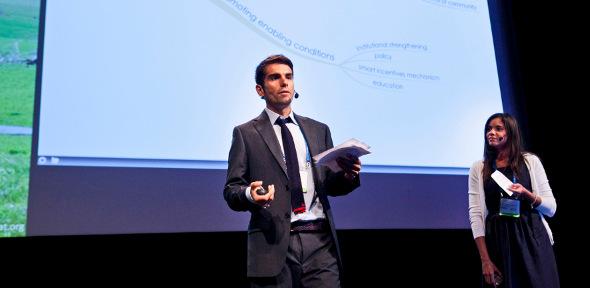
A research student from the Department of Engineering was among an elite group of young water scientists and professionals chosen to look at ways of ensuring the future of food and water supplies.
It was an incredible experience that enriched me both professionally and personally. Now it is time to start implementing some of these solutions...
Luca Di Mario
Luca Di Mario, a PhD student at the Centre for Sustainable Development, was selected to be part of the Young Professionals Core Group at the International Water Week held in Stockholm this summer. The conference is hosted and organised by the Stockholm International Water Institute (SIWI) and has been the annual focal point for global water issues since 1991.
The group of five young water professionals, coming from different regions and backgrounds, were asked to develop a vision for a 'Water and Food Secure World by 2050'. The aim of the group was to raise the voice of young professionals and influence the decision makers who attended the Week.
The conference attracted 2500 academics and stakeholders from across the world. They debated the challenges, strategies and solutions to the water and food security issues currently affecting billions of people, particularly in the developing world.
A Gates Scholar, Luca was asked to co-ordinate the Young Vision Leaders as they spent the week working and engaging with as many of their contemporaries as possible. Using video interviews and social media such as Twitter, Instagram, blogs and YouTube to engage with peers unable to attend the conference, the group developed a vision for the future which was presented by Luca at the closing ceremony.
He said: "We called ourselves the generation of the 'adaptive idealists' because we want an ideal world - we cannot accept otherwise - where universal and equal access to improved sanitation, safe water and food is ensured. At the same time, we recognise that the only way to achieve our ideal world is by being adaptive - developing solutions, strategies and approaches which are continuously checked and modified to respond to changing conditions. This is because we see that the only certain thing about the future is uncertainty.
"It was an incredible experience that enriched me both professionally and personally. Now it is time to start implementing some of these solutions..."
Amongst the many important issues and solutions discussed during the conference this year, the following themes captured most of the attention:
- The need to reduce food waste. Today we lose between 30-50% of food produced (and along with it, the water used).
- The need to shift to more resource-efficient diets: Given that meat production requires up to five times more water than cereals and there will be 9 billion people in 2050, there may not be enough water and food for everyone if we keep high levels of animal proteins in our diets.
- Links between sanitation and agricultural markets: how can we safely reuse sewage.

